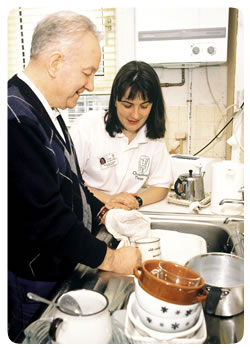
Tips during tasks
- Be patient try to let the person work the problem out first, then if they still have difficulty give a prompt or reminder.
- Work on just one task at a time. Try to do this when the person is not too tired.
- Break up the task into smaller steps, for example, pour water from tap into kettle and replace lid. This small task involves several stages in recognising the items, movements needed and timing to be able to complete the task. Once this stage has been successfully mastered add in another part of the task such as finding switch and checking when it is on or off.
- Start simple and work towards more complex tasks. Remember what you may think is simple can be a huge task for the person when affected by dyspraxia. This may seem very time consuming and does require a lot of patience but tasks we all do automatically take it can a long time to re learn for a person with dyspraxia.
- Be aware of safety. The person themselves may not be aware at all of a danger near by.
- Try a simplified list – include pictures for the person to follow the sequence of the task, especially if they keep getting stuck at the same point each time.
- Repetition and practice can lead to new pathways being formed in the brain. Even though it is quicker and easier for you to do the task , let the person attempt what they can and gradually build up to being more independent.
- Encouragement is important.
- Speak to the professionals who have been involved in assessing the persons dyspraxia, usually Occupational Therapists, Physiotherapists or Speech and Language Therapists ( if communication is the main issue), ask about how best to help the persons recovery.
You can print this page as a reminder of the tips.
For more information please read: NHS UK Dyspraxia (developmental co-ordination disorder) in adults